This week, I attended two completely different lectures about divestment. I’m not a finance guy. I don’t really know anything about investment or divestment; indeed, I have never invested a dime of my money in anything (unless you include donations to radical organizations or contributions made to Kickstarter projects). But, as I learned this week, many of the organizations, corporations, and institutions we interact with—and sometimes even identify with, and sometimes put our own money into—invest. And it behooves us to “follow the money,” so to speak, and to seek greater participation in determining exactly how and where our money is spent.
Tuesday night I attended a “Conversation with Bill McKibben & NYC Students” on the topic of “Divesting from Fossil Fuels.” Bill McKibben is a well known writer and environmentalist. As a journalist in the 1980s, he wrote about climate change in The End of Nature (which was later ripped apart by the environmental historians I read in graduate school!). As of the mid-2000s, McKibben took on new life as an activist, as the leader of 350.org, perhaps the world’s leading non-profit organization addressing climate change. In the summer of 2011—before Occupy Wall Street began, in the midst of the Arab Spring, and just following the Wisconsin uprising—he led a campaign of non-violent non-cooperation against the U.S. federal government. Over one thousand Americans, over the course of several weeks, occupied space in front of the White House and refused to budge in opposition to the proposed Keystone XL pipeline. 350.org is also co-organizing the Forward on Climate Rally on Feb. 17 (just nine days away), promising to be the largest climate rally in history. Many Free U folks are going to Washington, D.C. to participate. (We might also do well to remember that the largest environmental demonstration in world history, with an estimated 20 million participants, was the first Earth Day in 1970. Indeed, it was the largest demonstration of any kind, to my knowledge, in all American history. The climate rally next weekend promises to draw 20,000 people. So, we will need to multiply that by 1,000 to get to the numbers we had forty years ago.)
The event was hosted by NYU Divest, and held in the Great Hall of The Cooper Union. Our hosts were two NYU students.
McKibben spoke about the history of 350.org, then turned to the topic of divestment from fossil fuels. His organization is focused on getting colleges and universities to divest from oil, gas, and coal companies. That’s why he was here to talk with NYC students. Three colleges in the United States have already divested all their assets from fossil fuel companies, he reported. In New York City, student divestment groups have formed at NYU, Columbia, the New School, and at some CUNY campuses. As McKibben pointed out, colleges are hard pressed these days to sell how “green” they are to potential students. But it is not enough (nor is it just), he said, for colleges to invest millions of dollars in building LEED-certified “green” buildings to show off their “greenness” while at the same time failing to “green” their portfolios. Personally, I wonder how we may even begin to find out where our colleges and universities invest our assets. Perhaps in public university systems like CUNY and SUNY this is public information? We should find out.
Most students certainly would not want their tuition dollars being invested in oil, gas, and coal companies. And most students certainly would not want their money being used to oppress the Palestinian people, either.
The latter was the topic of discussion Thursday night at Brooklyn College at a talk by Judith Butler and Omar Barghouti on the topic of BDS: Boycotts, Divestment, and Sanctions as a non-violent tactic of resistance against Israeli institutions of power.
The event attracted an almost undue amount of attention over recent weeks (although, as Butler and Barghouti admitted, the attention was beneficial in that it helped draw out a huge crowd, approximately 250 persons). Politicians last week fought over whether or not they thought Brooklyn College should host an event variously labeled as “racist,” “anti-Semitic,” or “anti-Israel,” and many other crazy things. I wrote about this controversy earlier in the week. Unsurprisingly, the event drew many demonstrators on various sides of the BDS/Israel issue. (One of the lessons Butler shared with us was that when we boil down the complexities of the Israel/Palestine issue to a binary—either you are pro-Israel or you are anti-Israel—we miss opportunities to explore deeper questions about oppression and democratic rights, and we also alienate ourselves from one another. The point, she said, is that BDS is neither pro-Israel nor anti-Israel, but it seeks justice and equality for Palestinian peoples in Israel, in the occupied territories, and for the millions living outside of Palestine as refugees. The existence or non-existence of the state of Israel is not the issue; the issue is the current policies of oppression carried out by Israeli state institutions against Palestinians.)
It is difficult to discuss the demonstrations outside the event, however, without resorting to binary language, because the NYPD forced protesters to stand in one of two boxes that they artificially created: there was a “pro” police barricade and an “anti” police barricade. But what were these demonstrators “pro-” and “anti-” for and against? When I arrived at 5:30pm, only a few demonstrators were present in either of the barricaded zones. As the evening progressed, I was able to witness the NYPD shepherding demonstrators behind one or the other of the barricades. When a large group of anti-Zionist orthodox Jews arrived, an NYPD officer initially looked like he was going to lead them to the “pro” (as he called it) police barricade (although it was the “anti”-BDS side, and these guys were apparently “pro”-BDS). After some conversation, the Jews were directed to the “anti” side. At that moment I overheard one police officer say to the other, “Wait. I thought that [pointing toward the side with Israeli flags] was the pro-Jewish camp, and that [pointing the other way] was the Palestine camp.” Those were his exact words. I wanted to approach him and say, “These aren’t pro-Jewish/anti-Palestinian and anti-Jewish/pro-Palestinian camps! This isn’t about race or religion. I’m Jewish and I am firmly against Zionism!” Of course, the anti-Zionist orthodox Jews explained that position well enough before I had to. The whole episode demonstrates the deep complexity of taking “pro” and “anti” positions on the Israel/Palestine issue. Politicians and ideologues on both sides often want to reduce the debate to overly simplistic binaries. But, as Butler and Barghouti passionately argued, it’s not that simple.
(However, what we can [and should and must] take strong “anti” positions on, Butler and Barghouti said, are oppression, violence, inequality, apartheid, colonialism. Whether it’s Israel, the United States, or any other institution of power, we must oppose the subjugation of human rights and the execution of war crimes.)
Both divestment struggles will be hard fought campaigns. Both will require ambition, perseverance, determination, and lots of patience. Both, I suspect, will be successful. But it will take a long time. During the Q & A Thursday night, a student asked Omar Barghouti, “was fighting apartheid this hard back in the 1980s in the struggle against South Africa? Because it feels really hard right now in the struggle for justice in Palestine.” Barghouti responded by saying that the African National Congress first called for boycotts in the 1950s, and only in the 1980s did the rest of the world really start to take the South African struggle seriously. It took twenty-fives years, Barghouti said. The struggle for justice in Palestine will be just as hard-fought, if not harder. But, as with South Africa, he predicted, the fight for equality and dignity for all people will eventually be victorious.
[The views expressed in this blog are sometimes those of individuals and sometimes that of the collective. Today’s post reflects the views solely of the author listed above.]
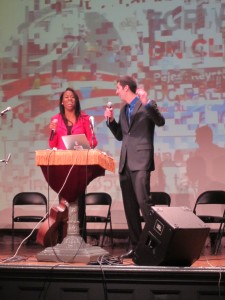
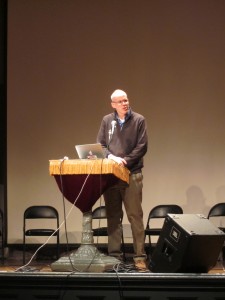
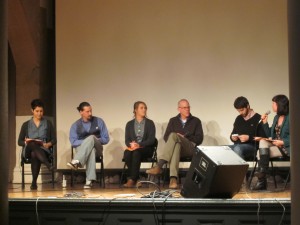
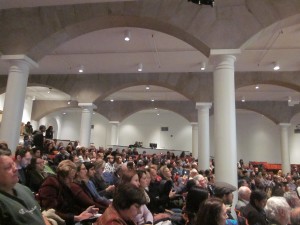
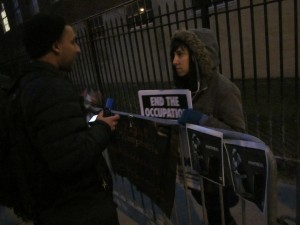
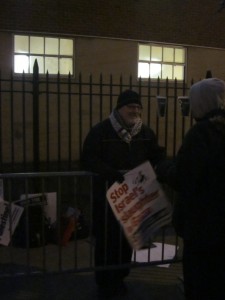
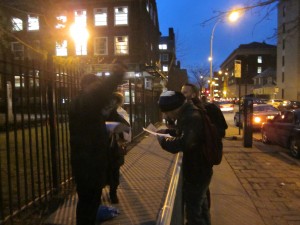
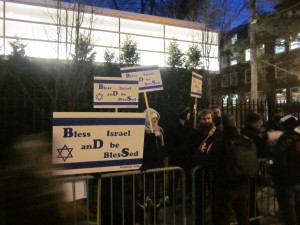
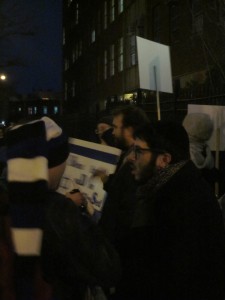
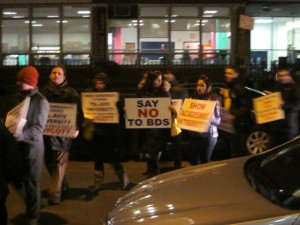
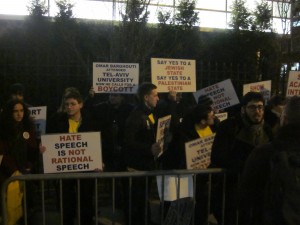
Comments by Gregory Rosenthal